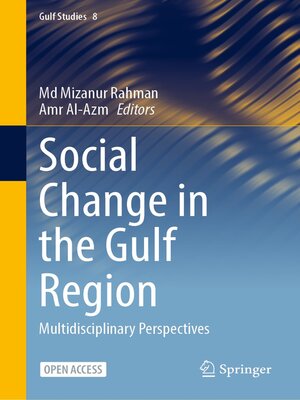Social Change in the Gulf Region
ebook ∣ Multidisciplinary Perspectives · Gulf Studies
By Md Mizanur Rahman

Sign up to save your library
With an OverDrive account, you can save your favorite libraries for at-a-glance information about availability. Find out more about OverDrive accounts.
Find this title in Libby, the library reading app by OverDrive.



Search for a digital library with this title
Title found at these libraries:
| Library Name | Distance |
|---|---|
| Loading... |
This open access book, comprising thirty-nine chapters divided into social, cultural, economic, and political spheres, offers a unique opportunity to dive into the complex, dynamic, and sometimes contradictory transformation of Gulf societies in the last few decades. Whilst the Gulf region has at times been seen as impervious to this natural phenomenon of transformation—timeless, never changing, deeply rooted in its ancient tribal customs and traditions and able to blend past and present seamlessly without suffering the wrenching trauma of change—this is clearly not the case, and the region is not immune to the inevitable forces of social change. There is no doubt today that the social change sweeping the Gulf has been profound, affecting almost every aspect of life in the Gulf societies. This volume has an encyclopedic value as the chapters collectively offer multifaceted and multidisciplinary perspectives to understand social change in the Gulf region. Through these chapters, the role of economic and educational transformation, and the impact of social media, migration, and urbanization have in driving social change in the Gulf societies is examined in detail with a focus on their directions, magnitudes, and relevant policy options. It also considers how COVID-19 is affecting the lives of the people in the Gulf. This book bridges gaps in the understanding of the rapid pace of social change in the Gulf, offering practical solutions for policy interventions. It is of interest to scholars and students in Middle Eastern studies, specifically, as well as sociology, media studies, migration studies, and educational policy.







